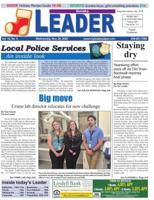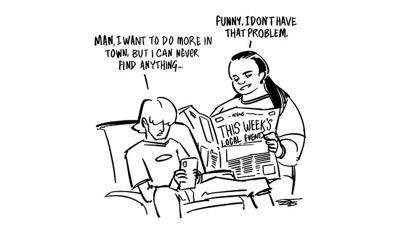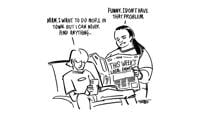For much of my life, I had never considered myself “in the loop,” but I can safely say that is no longer the case.
Though my role at Leader Publications largely relates to page design and keeping track of special sections, it is impossible to work all day in a newsroom and not soak in the local goings-on.
These days, family members come to me with questions and rumors they’re wanting to verify: “when is that restaurant supposed to open?” or “what’s the deal with the road construction going on?”
More often than not, I actually know the answer (or I can just swivel my chair to the right and pester my coworker, Kevin, for the answer).
While I certainly have a leg-up when it comes to being savvy about news in the area, my knowledge isn’t kept under lock and key.
You can learn the same information just by reading the Leader, a hyper-local publication that connects people to resources and reliable news that is tough to find elsewhere.
In the digital age, so many of the stories we encounter are about national or global issues. If you think about it, I bet you’ll agree that the news that comes across your screen, whether on social media, TV, national news sites or elsewhere, is disproportionately about faraway people and places.
I can’t tell you how many times I get excited about an event I see on Facebook or Instagram only to realize it’s in someplace like New York or Chicago.
It’s important to be informed about issues abroad. But it’s frustrating how much easier it is to access information from halfway across the world than it is to find out what’s happening in our own backyards.
Most every story that comes out of the Leader newsroom has a local connection. Highlighting people and topics that hit close to home is important. It’s inspiring to see people in your own community donating time and energy to help those around them.
Reading about groups cleaning up trash from a river, fundraising for mental health services or even celebrating a longtime teacher’s retirement helps me feel closer to the place I call home.
This local identity is often lost in online spaces.
Aside from community, local journalism shines a spotlight on people in power and demands accountability. How else does one find out about what local elected officials are doing or what improvements the local school district is working on?
Some of this may be found on social media or by asking around, but are the right questions being asked? And how was information verified?
Not only does the Leader compile and print relevant stories all in one place, but reporters have the knowledge to hunt down the facts and build relationships with reliable sources.
The reporters I share my workspace with spend long weeknights attending board meetings, town halls and open houses. Then, they follow up and verify information.
I find it comforting to know that people are keeping an eye on these processes and explaining how it affects the average person. Since joining the paper and paying more attention to municipal coverage, I have been much more tuned-in to local elections and legislation, which motivates me to look into statewide issues as well.
But, like most who pick up the paper, my introduction to local journalism began much, much earlier.
Born and raised in the Festus area in the late '90s, I have not known life without the Leader.
As a kid, I used the paper to look up movie showings at my local theater.
In high school, the paper printed a photo of my school’s newspaper/yearbook team, which I was a part of. The clipping, yellowed over time, is still pinned to the corkboard in my room.
In college, I would scan the nuptials and births (and, I admit, the obits) for familiar names of old classmates.
It’s special to have everyday lives documented and celebrated, and it makes me feel closer to my community.




